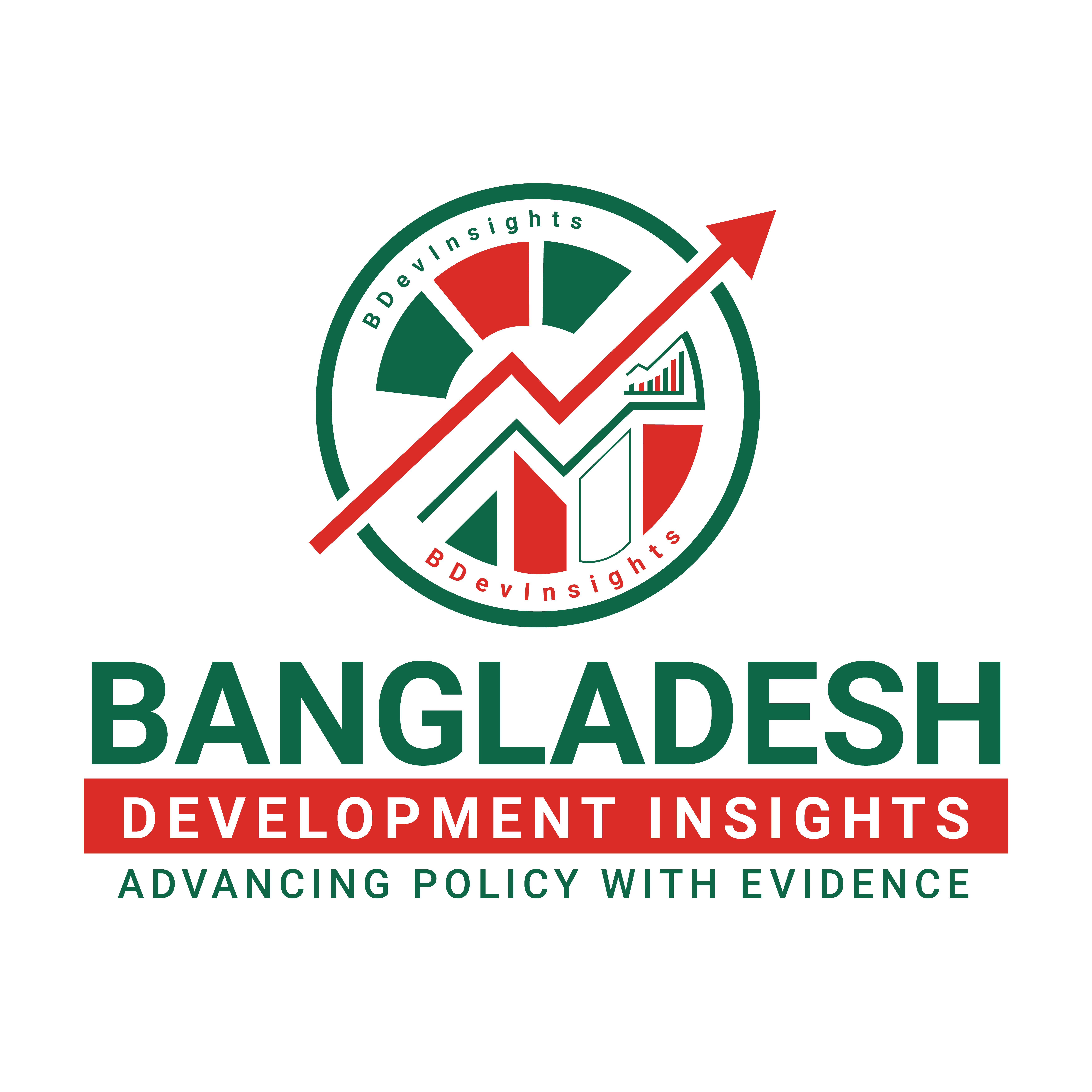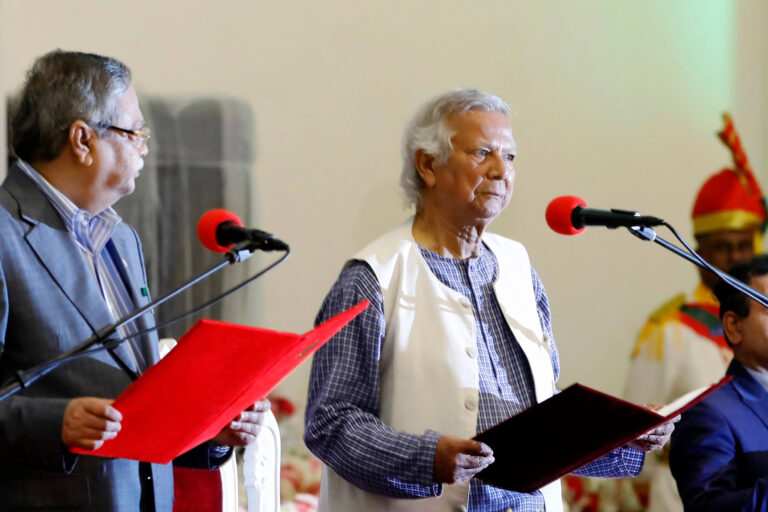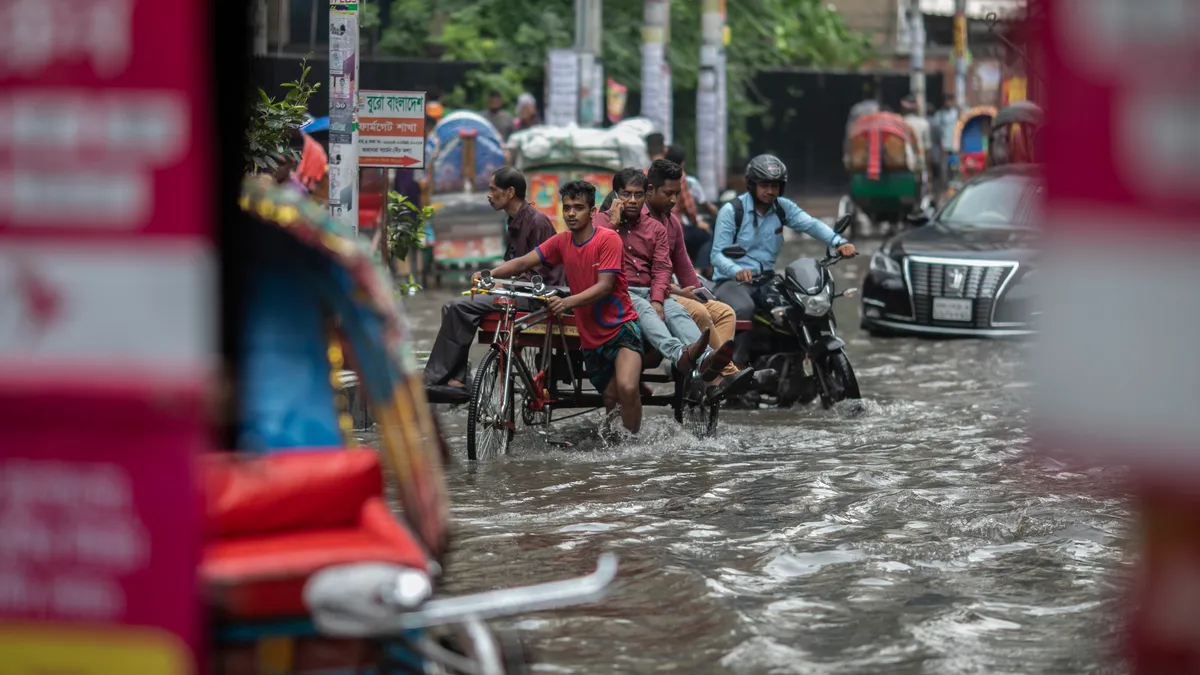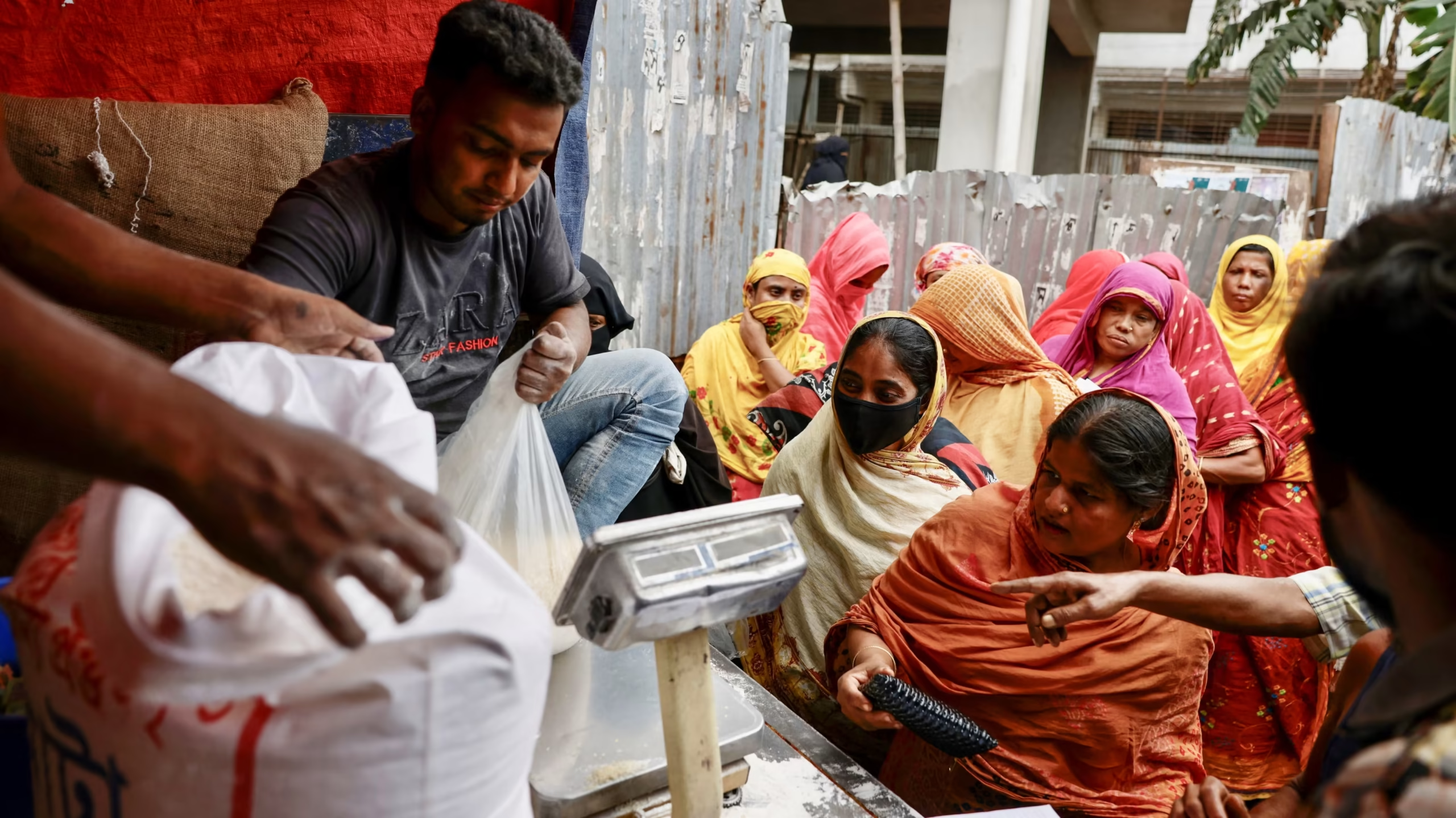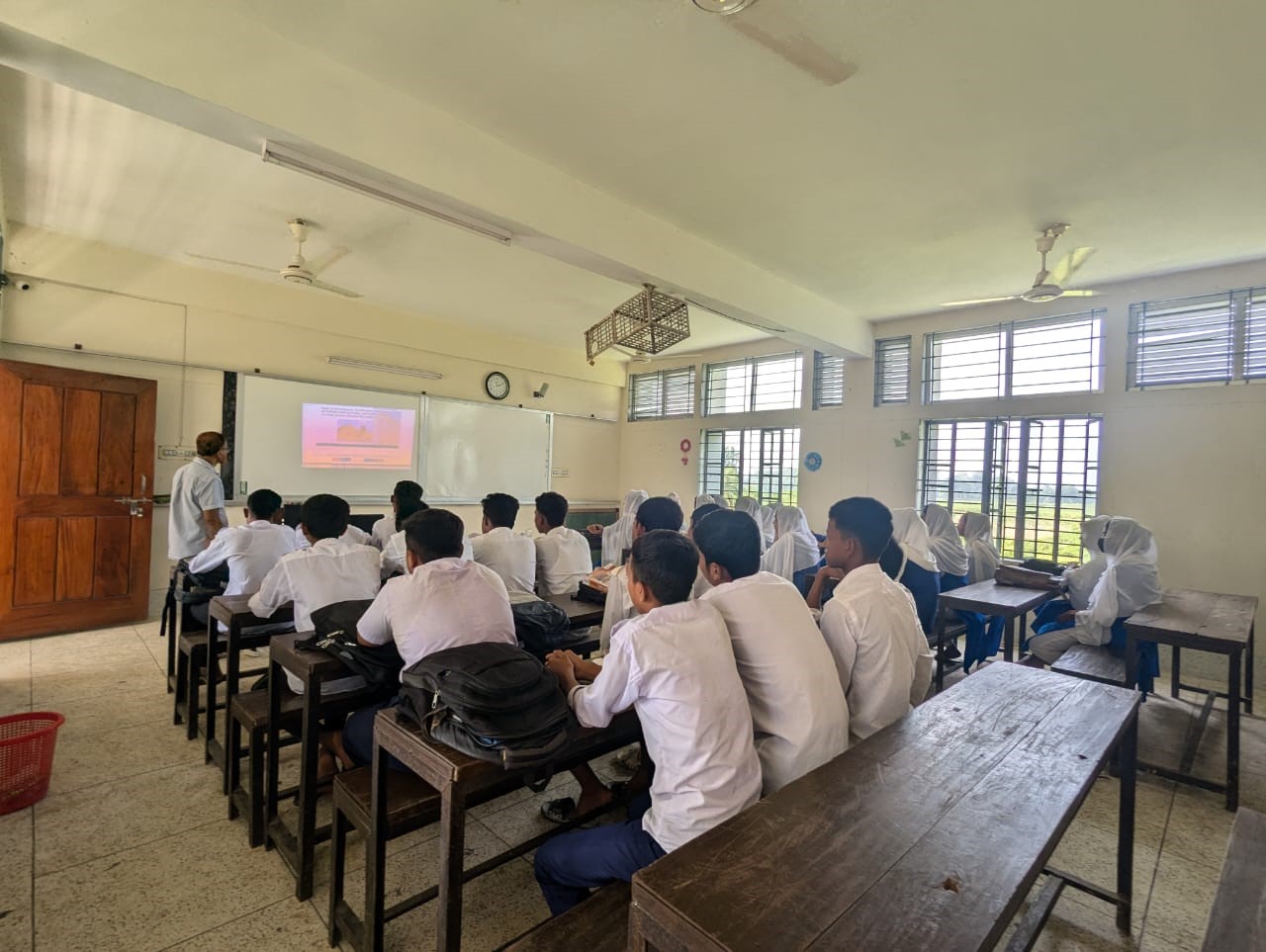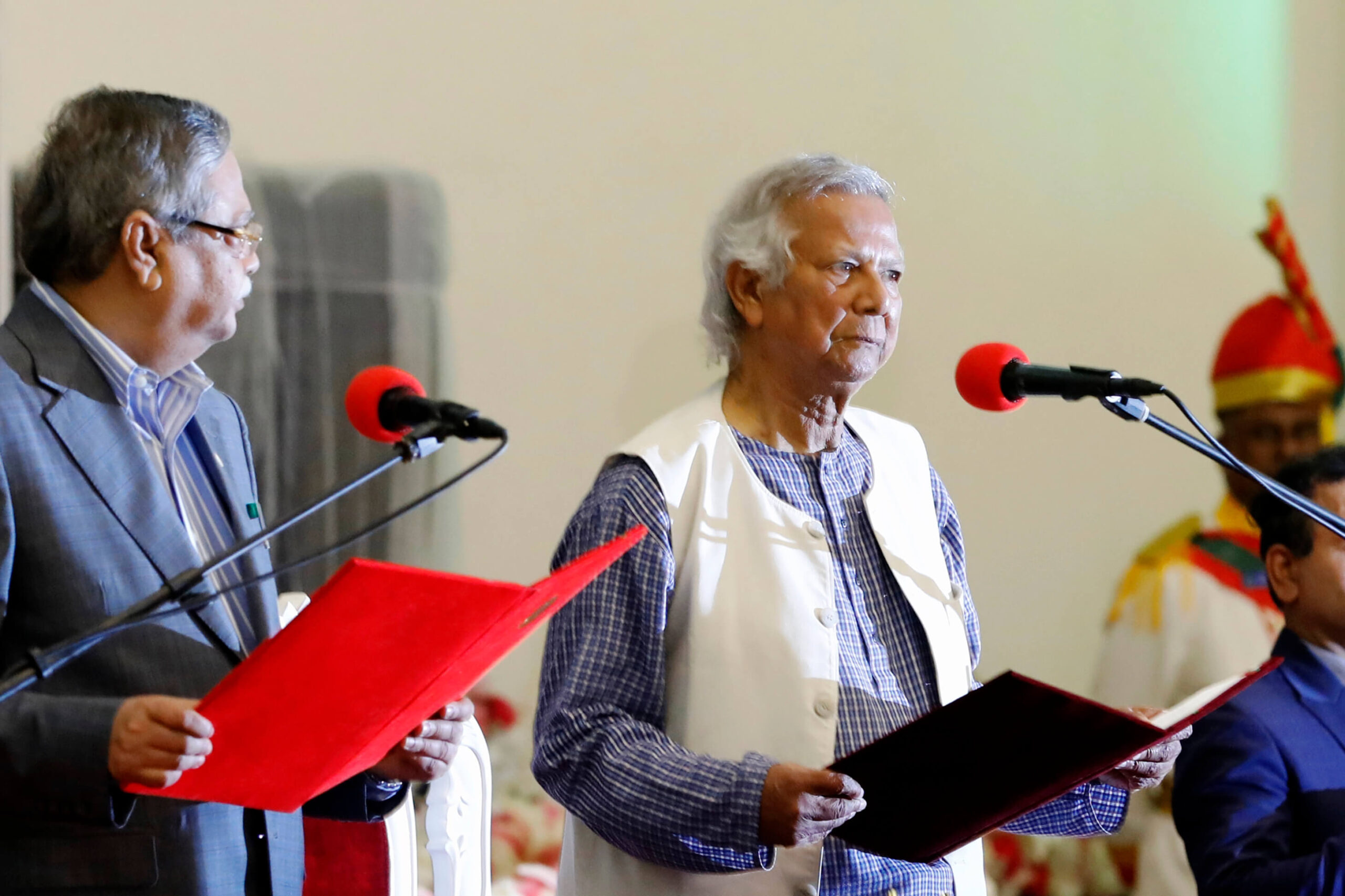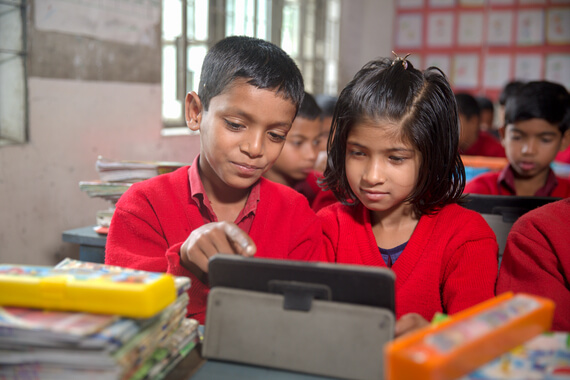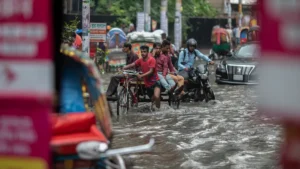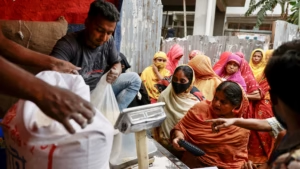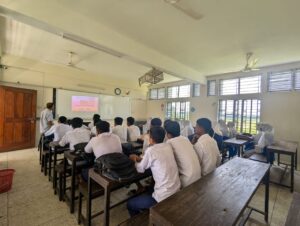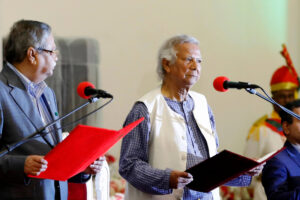Bangladesh is at a critical crossroads following the recent political upheaval that led to the fall of Sheikh Hasina’s government. This event exposed deep, underlying fractures within the country’s institutions and political framework. What began as student-led protests against the perceived injustices in job quotas quickly morphed into a nationwide movement demanding not just reform but a fundamental change in governance—democracy, justice, and comprehensive economic reform.
The government’s response was swift and brutal. In an effort to suppress the unrest, ‘shoot-on-sight’ orders were issued, and police forces, alongside members of the ruling party’s student wing, used live ammunition against protestors.
Hundreds were killed, while thousands more were injured or detained without due process. The scope and scale of the violence were unprecedented, especially the brutal treatment of students who were fighting for reforms to the quota system. This highlighted the government’s profound disregard for human rights and democratic principles, exposing its increasing reliance on authoritarian tactics.
For years, Bangladesh had been sliding away from democracy, with elections marred by vote rigging and voter intimidation. The judiciary had gradually transformed into a tool of political repression rather than an independent arbiter of justice.
This wave of unrest eventually forced Sheikh Hasina to flee the country, bringing her administration to a sudden and dramatic end. Her fall from power was a culmination of years of mounting discontent, brought to the surface by systemic failures and social inequities that had long festered beneath the surface.
After her departure, Nobel laureate Muhammad Yunus took the reins as head of an interim government. His leadership has sparked hope among much of the population, providing a temporary sense of relief and optimism for the future. However, the political crisis that brought down Sheikh Hasina’s government was not a singular event, nor was it an anomaly. It was the result of years of growing dissatisfaction, mistrust in institutions, and a government increasingly viewed as corrupt and unresponsive. Now, Yunus and his administration face the monumental task of stabilising a country in turmoil while simultaneously laying the foundation for long-term democratic reform.
One of the driving forces behind the recent protests has been the frustration of Bangladesh’s youth, who, despite the country’s economic growth, find themselves caught in a cycle of unemployment or underemployment. The official youth unemployment rate stands at 10.6 per cent, though this figure likely underestimates the full scale of the problem due to widespread underemployment and informal work that provides little security. The situation is particularly dire for university graduates. Nearly half of these young people are unable to find jobs that match their qualifications, leaving them disillusioned and frustrated.
The protests that led to the downfall of the government were initially sparked by grievances over the job quota system, but they quickly evolved into a much broader expression of anger and frustration. For many young Bangladeshis, the disconnect between their education and the realities of the job market reflects a deeper failure of governance.
Though the economy has grown, and certain sectors have flourished, the benefits of this growth have not been evenly distributed. For a large portion of the population—especially the educated youth—the future remains uncertain and bleak. This growing sense of frustration and disenchantment represents a ticking time bomb for Bangladesh’s social and political stability, as an entire generation begins to lose hope for a better future.
This youth unemployment crisis is inextricably linked to the fundamental weaknesses in Bangladesh’s education system. While the number of university graduates has surged in recent years, the quality of education has lagged far behind. Outdated curricula, inadequate instruction, and a lack of practical skills training have left graduates ill-prepared for the demands of a modern, increasingly competitive economy.
One of the most glaring issues within the education sector is its politicisation. Teacher appointments are often made based on political connections rather than merit, further undermining the quality of education. As a result, universities are producing graduates en masse, but many of these young people lack the skills or knowledge required to succeed in the workforce. Reforming the education system has been a topic of discussion in Bangladesh’s political discourse for years, but progress has been painfully slow. Unless significant reforms are implemented to bridge the gap between education and the labour market, the cycle of frustration and unrest will continue, with dire consequences for the country’s stability.
Another key factor in the recent protests was the judiciary’s controversial decision to reinstate job quotas for freedom fighters and their descendants. This decision, which was widely seen as politically motivated, reignited long-simmering frustrations among students and youths. Over the years, the judiciary had increasingly come to be viewed as a tool of political repression, with judicial appointments and promotions often dictated by loyalty to the ruling party rather than merit or independence.
The politicisation of the judiciary has severely eroded public trust in the legal system. Rather than serving as a check on executive power, the judiciary has been co-opted to further the political objectives of those in power. The consequences of this erosion of trust extend far beyond the legal system itself—investors and citizens alike require a fair, impartial, and predictable legal environment to feel secure. The current crisis has made clear that restoring the integrity of the judiciary must be a top priority if Bangladesh is to regain stability and move forward as a functional democracy.
While the political instability may have been the spark that ignited the recent crisis, the country’s economic challenges have long been brewing beneath the surface. Inflation in Bangladesh has reached record levels, with the overall rate hitting 11.66 per cent in July 2024, the highest in 12 years. Food inflation is even worse, standing at 14.10 per cent, making basic necessities such as rice, vegetables, and cooking oil unaffordable for many families. This surge in prices has been driven by rising global energy costs, increased import prices, and a growing trade deficit.
These economic challenges are further compounded by the devaluation of the taka. With reserves falling below $20 billion from $45 billion three years ago, the currency has been under severe pressure. Income inequality is rising, with the poorest segments of society bearing the brunt of rising prices for essential goods. The rising cost of living has shattered the illusion of broad-based development that the previous government often propagated, revealing instead a fragile economy that is struggling to meet the basic needs of its people.
Bangladesh’s growing public debt is another major challenge that the interim government must confront. The country’s debt-to-GDP ratio has been rising steadily, leading to concerns about the government’s ability to manage its fiscal obligations. In 2024, Bangladesh’s external debt reached $100 billion, a fivefold increase from $22 billion in 2012. While the previous government was able to successfully complete major infrastructure projects like the Padma Bridge, these achievements came at the high cost of borrowing from external sources. Bangladesh’s tax-to-GDP ratio has remained stubbornly low, at around 8 per cent, one of the lowest in the world. This points to the government’s inability to mobilise resources internally, further exacerbating the country’s fiscal challenges.
The country’s tax system is highly regressive, collecting more revenue from the poor than from the rich. Poor tax compliance, corruption, administrative inefficiency, complex tax rules, and a lack of awareness are some of the major reasons behind such a low tax-GDP ratio. Additionally, the scope of money laundering, cash transactions in business, and poor tax collection from medium and large-scale enterprises contribute to the country’s fiscal vulnerabilities.
Weaknesses in Bangladesh’s banking sector pose yet another serious risk to economic stability. Billions of dollars have been laundered out of the country’s banking system by individuals and businesses with government connections. This widespread corruption is now well-documented in both national and international media. Large corporate borrowers have been able to siphon off funds, often with the tacit approval of the government. This has left Bangladesh’s banks highly vulnerable, with a significant proportion of loans classified as non-performing—meaning that borrowers are unable to repay their debts. These non-performing loans have caused liquidity shortages, undermining confidence in the financial system. Compounded by weak regulatory oversight, these vulnerabilities threaten to trigger a broader financial crisis if they are not addressed quickly.
To address these economic challenges, the Yunus administration must prioritise fiscal discipline. This will involve reducing unnecessary expenditures, improving tax collection mechanisms, and ensuring that public funds are allocated efficiently. Stabilising the banking sector must be a top priority, with reforms needed to improve regulatory frameworks and enforce stricter oversight of lending practices. Reducing the volume of non-performing loans through measures such as loan restructuring, improved risk management, and tighter lending criteria is essential to restoring confidence in the financial system.
Bangladesh’s garment industry, which employs millions of workers and is a significant source of foreign exchange, has also been facing a series of challenges that threaten its long-term sustainability. Declining global demand, coupled with increased competition from other garment-producing nations, has led to a significant reduction in international orders. To support the garment sector, the government must focus on improving competitiveness by enhancing worker productivity and ensuring compliance with international labor standards. Diversifying export markets and exploring new trade agreements can also help stabilise the industry. Additionally, investments in technology and innovation will be critical to making the garment sector more resilient in the face of global challenges.
Bangladesh’s heavy reliance on energy imports, particularly liquefied natural gas (LNG) and crude oil, has left the country vulnerable to volatile global energy markets. In recent years, the use of coal for power generation has increased, while the share of fuel oil and diesel in Bangladesh’s energy mix has risen to its highest level in over a decade. These rising energy costs have driven up prices for electricity and fuel, putting significant strain on both industrial production and household budgets. For industries like garment manufacturing, which rely on low-cost labour to maintain competitiveness, these rising energy costs represent a serious threat to profitability.
Addressing the energy crisis will require a multifaceted approach. The government must work to diversify the country’s energy sources by investing in renewable energy projects to reduce reliance on imported fuels. Improving energy efficiency and expanding access to affordable, sustainable energy can help ensure that Bangladesh’s industries remain competitive while shielding households from future energy price shocks.
The task ahead for Muhammad Yunus and his interim government is monumental. Stabilising the economy is only the first step—deep, systemic reforms are needed to restore faith in governance and build a sustainable, democratic future. To stabilise Bangladesh, the government must implement wide-reaching reforms across all sectors:
Reform the Education System: A major overhaul of Bangladesh’s education system is essential to address the disconnect between higher education and the job market. Curricula must be updated to equip students with practical skills that match market demands, and quality instruction must become a priority. Investing in vocational training and aligning education with industry needs can help reduce youth unemployment and foster economic growth.
Strengthen the Judiciary: Restoring the integrity of the judiciary is critical to rebuilding trust in public institutions. The judiciary must be independent, with appointments based on merit rather than political loyalty. Transparency and accountability in the legal system will be essential to attracting both domestic and international investment, as well as restoring the rule of law.
Address Debt and Fiscal Challenges: Implementing fiscal discipline is vital for managing public debt and ensuring that the government has the resources to invest in key sectors. This includes cutting unnecessary expenditures, enhancing tax collection, and seeking debt restructuring where needed.
Stabilise the Economy: Addressing inflation and stabilising the currency should be immediate priorities. The government must take steps to rebuild foreign reserves, reduce reliance on energy imports, and encourage investment in renewable energy. In addition to supporting key industries like garment manufacturing, the government should promote technology-driven growth to harness the skills of the younger generation and create millions of new jobs that will be crucial for sustaining long-term economic growth.
Ensure Democratic Accountability: Finally, the government must prepare for free and fair elections, ensuring a smooth transition to a democratically elected government. Upholding democratic norms and protecting civil liberties are key to preventing future unrest.
The current crisis in Bangladesh is both a political and economic reckoning, a convergence of systemic failures across governance, education, the judiciary, and the economy. Muhammad Yunus’s interim government has the opportunity—and responsibility—to implement deep reforms that address these structural weaknesses. By doing so, Bangladesh can not only stabilise but also emerge stronger, more democratic, and more equitable for its people.
(Views expressed are personal)
Asad Islam is Professor of Economics and Director, Centre for Development Economics and Sustainability (CDES), Monash University, Australia
M. Mehrab Bakhtiar is Research Fellow, International Food Policy Research Institute (IFPRI), Washington, USA
